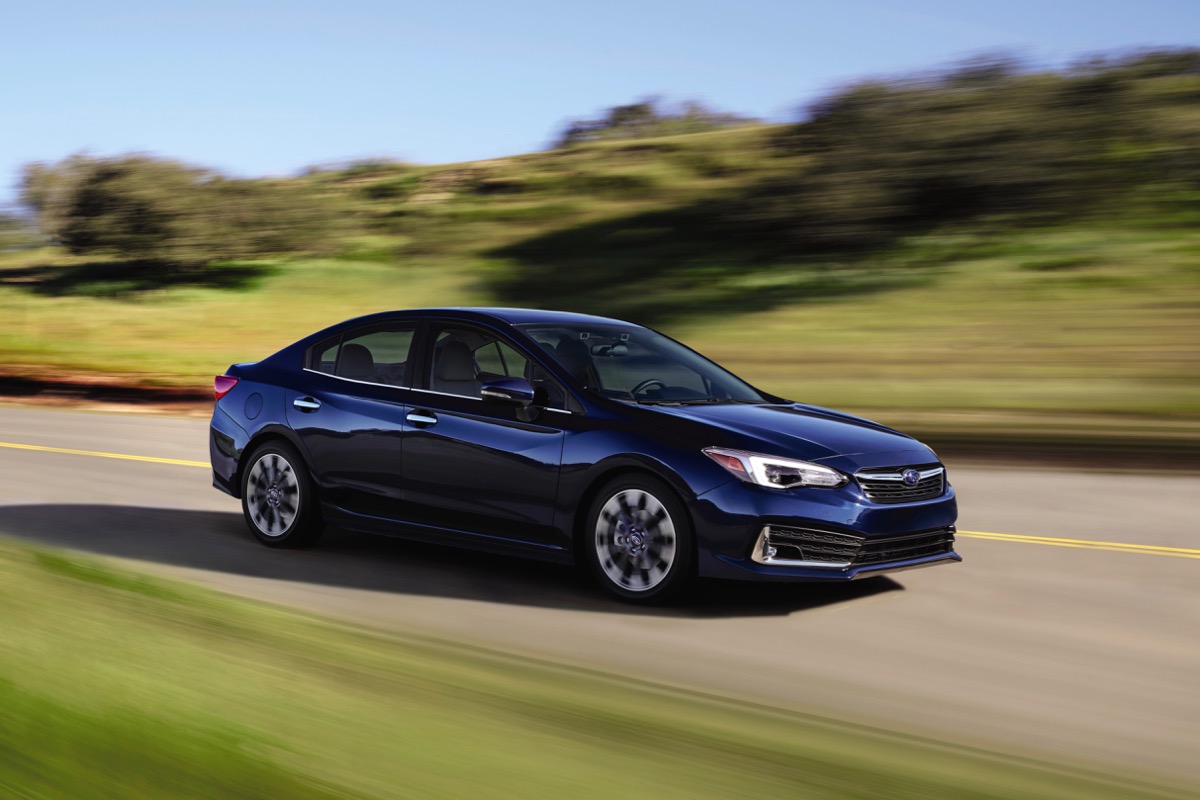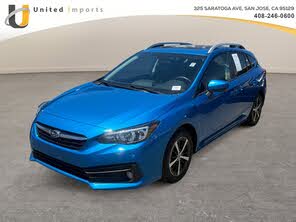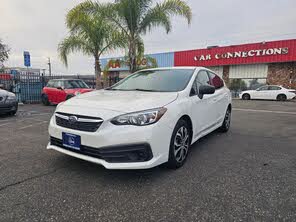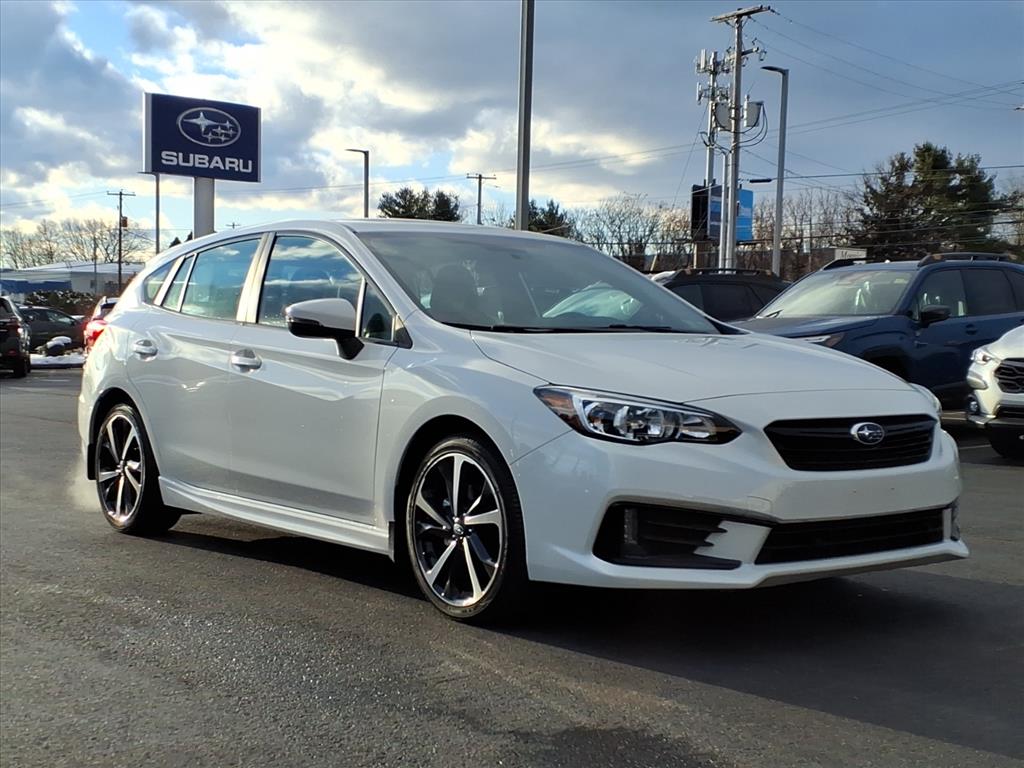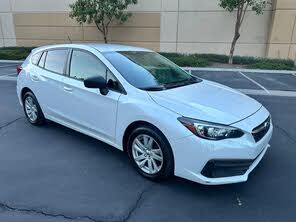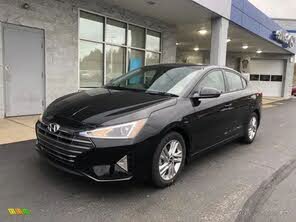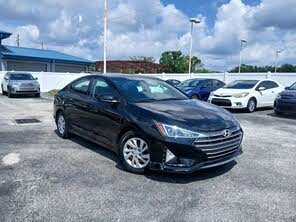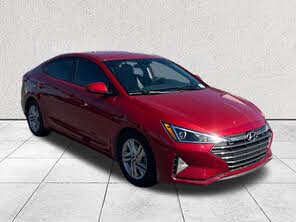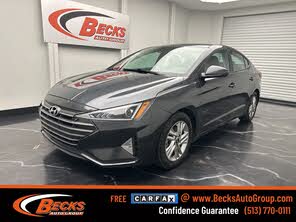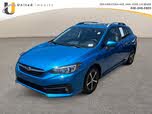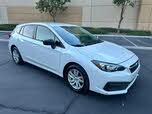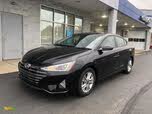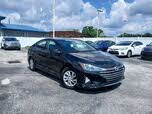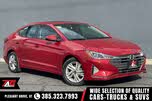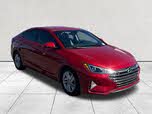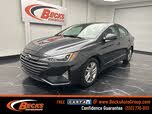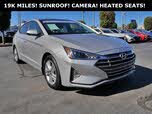2021 Subaru Impreza vs 2020 Hyundai Elantra
Overview | |
MSRP$19,300 | MSRP$18,795 |
Listings1052 | Listings130 |
Ratings & Reviews | |
User Reviews | User Reviews |
Expert reviews8.3 out of 10 | Expert reviews7.7 out of 10 |
Pros
Cons
| Pros
Cons
|
2020 Hyundai Elantra Reviews SummaryHyundai isn’t pulling any punches when it comes to the compact car segment, where value is of utmost importance. And though a completely redesigned 2021 Elantra is coming soon, the automaker bestows several value-enhancing improvements upon the outgoing 2020 Hyundai Elantra compact sedan. They include free scheduled maintenance, improved fuel economy ratings, and new standard safety features. | |
2021 Subaru Impreza Reviews SummarySubaru developed a cult following thanks to cars like the Impreza. Thanks to standard all-wheel drive (AWD), the Impreza has been a hit in wintry climates, offering the low operating costs of a compact car without the limited foul-weather capability of the mostly front-wheel drive (FWD) competition. The current Impreza represents the model’s fifth generation, and dates back to the 2017 model year. Available in sedan and hatchback form, the Impreza has also spawned the sporty Subaru WRX and more rugged looking Subaru Crosstrek, which have overshadowed the basic Impreza to some extent. We’ll cover the WRX and Crosstrek in separate reviews. Changes for the 2021 model year are limited to availability of SI-Drive drive modes on the Impreza Premium trim level (this feature was previously available only on the Impreza Sport) and a $100 price increase. The full Impreza lineup remains unchanged, encompassing base, Premium, Sport, and Limited trim levels for both the sedan and hatchback. Consequently, we’ll look back on our experience with previous model years for this overview. | |
No video found | No video found |
Popular Features & Specs | |
Engine2.0L 147 hp I4 | Engine2.0L 152 hp H4 |
Drive TrainFWD | Drive TrainAWD |
Seating Capacity5 | Seating Capacity5 |
Horsepower147 hp @ 6200 rpm | Horsepower152 hp @ 6000 rpm |
MPG City31 | MPG City28 |
MPG Highway41 | MPG Highway36 |
Engine | |
Engine Name2.0L 147 hp I4 | Engine Name2.0L 152 hp H4 |
Torque132 lb-ft @ 4500 rpm | Torque145 lb-ft @ 4200 rpm |
Horsepower147 hp @ 6200 rpm | Horsepower152 hp @ 6000 rpm |
DrivetrainFWD | DrivetrainAWD |
Fuel Economy | |
MPG City31 | MPG City28 |
MPG Highway41 | MPG Highway36 |
Interior | |
Seating Capacity5 | Seating Capacity5 |
Safety | |
Front Crash Overall4 | Front Crash Overall5 |
Side Crash Overall4 | Side Crash Overall5 |
Dimensions & Capacity | |
Cargo Space14.4 cu ft | Cargo Space12.3 cu ft |
Curb Weight2844 lbs | Curb Weight3047 lbs |
Height56.5 in | Height57.3 in |
Length181.9 in | Length182.7 in |
Width70.9 in | Width79.4 in |
Wheelbase106.3 in | Wheelbase105.1 in |
Maximum Payload1080 lbs | Maximum Payload1252 lbs |
Number of doors4 | Number of doors4 |
Overview | ||
MSRP | $19,300 | $18,795 |
Listings | ||
Ratings & Reviews | ||
User reviews | ||
Expert reviews | 8.3 out of 10Read full review | 7.7 out of 10Read full review |
Pros & cons | Pros
Cons
| Pros
Cons
|
Summary | Hyundai isn’t pulling any punches when it comes to the compact car segment, where value is of utmost importance. And though a completely redesigned 2021 Elantra is coming soon, the automaker bestows several value-enhancing improvements upon the outgoing 2020 Hyundai Elantra compact sedan. They include free scheduled maintenance, improved fuel economy ratings, and new standard safety features. | Subaru developed a cult following thanks to cars like the Impreza. Thanks to standard all-wheel drive (AWD), the Impreza has been a hit in wintry climates, offering the low operating costs of a compact car without the limited foul-weather capability of the mostly front-wheel drive (FWD) competition. The current Impreza represents the model’s fifth generation, and dates back to the 2017 model year. Available in sedan and hatchback form, the Impreza has also spawned the sporty Subaru WRX and more rugged looking Subaru Crosstrek, which have overshadowed the basic Impreza to some extent. We’ll cover the WRX and Crosstrek in separate reviews. Changes for the 2021 model year are limited to availability of SI-Drive drive modes on the Impreza Premium trim level (this feature was previously available only on the Impreza Sport) and a $100 price increase. The full Impreza lineup remains unchanged, encompassing base, Premium, Sport, and Limited trim levels for both the sedan and hatchback. Consequently, we’ll look back on our experience with previous model years for this overview. |
Video | No video found | No video found |
Popular Features & Specs | ||
Engine | 2.0L 147 hp I4 | 2.0L 152 hp H4 |
Drive Train | FWD | AWD |
Seating Capacity | 5 | 5 |
Horsepower | 147 hp @ 6200 rpm | 152 hp @ 6000 rpm |
MPG City | 31 | 28 |
MPG Highway | 41 | 36 |
Engine | ||
Engine Name | 2.0L 147 hp I4 | 2.0L 152 hp H4 |
Torque | 132 lb-ft @ 4500 rpm | 145 lb-ft @ 4200 rpm |
Horsepower | 147 hp @ 6200 rpm | 152 hp @ 6000 rpm |
Drivetrain | FWD | AWD |
Fuel Economy | ||
MPG City | 31 | 28 |
MPG Highway | 41 | 36 |
Interior | ||
Seating Capacity | 5 | 5 |
Safety | ||
Front Crash Overall | 4 | 5 |
Side Crash Overall | 4 | 5 |
Dimensions & Capacity | ||
Cargo Space | 14.4 cu ft | 12.3 cu ft |
Curb Weight | 2844 lbs | 3047 lbs |
Height | 56.5 in | 57.3 in |
Length | 181.9 in | 182.7 in |
Width | 70.9 in | 79.4 in |
Wheelbase | 106.3 in | 105.1 in |
Maximum Payload | 1080 lbs | 1252 lbs |
Number of doors | 4 | 4 |
The 2020 Hyundai Elantra, last redesigned in 2017 and restyled in 2019, remained visually unchanged for the 2020 model year. The previous year's restyle introduced a geometric-influenced appearance, setting the stage for the dramatically angular styling of the upcoming 2021 Elantra. Available in six versions—SE, SEL, Value Edition, Eco, Limited, and Sport—the Elantra's price ranged from $19,300 to $24,150. The Limited test vehicle, equipped with the Ultimate Package and floor mats, brought the total to $27,630, including the $975 destination charge. The Elantra GT hatchback was also available for 2020.
A black paint job highlighted the Elantra’s angular headlight, fog light, and wheel designs, contrasting sharply with the chrome grille, beltline, and logo detailing. The result was a stylish small car, though not universally appealing. The interior received an upscale update with silver trim on various elements, though hard and glossy plastics reminded occupants that it was still a mainstream compact car.
The 2021 Subaru Impreza adopted a more conservative design compared to its past styling risks, such as large round headlights and box fender flares. Despite its subtlety, the Impreza maintained a handsome appearance. Both sedan and hatchback versions featured sleek headlights and taillights, a nicely-tapered front end, and scalloped body sides. The awkward wheel arch sheet metal from the previous generation was toned down. The Impreza Sport models received specific styling touches, including 18-inch alloy wheels, while base models had 16-inch steel wheels.
Built on the Subaru Global Platform, shared with models like the Legacy, Outback, Forester, and Ascent, the Impreza benefited from overall refinement. The interior design was typical of compact cars, with a split dashboard housing the infotainment touchscreen and various forms of plastic. The Impreza Sport featured contrast stitching, a leather-wrapped steering wheel, and aluminum pedals, while the Limited trim offered standard leather upholstery and LED headlights.










The 2020 Hyundai Elantra featured a base 147-horsepower, 2.0-liter four-cylinder engine paired with a new continuously variable transmission (CVT), replacing the previous six-speed automatic and manual gearboxes. The CVT, standard with SE trim, contributed to a $1,100 price increase from the previous year. All Elantra models were front-wheel drive.
Specialty models included the Elantra Eco, with a turbocharged 1.4-liter four-cylinder engine producing 128 horsepower and 156 lb-ft of torque, paired with a seven-speed dual-clutch automatic transmission (DCT) and an automatic engine start/stop system. The Eco achieved 36 mpg in combined driving. The Elantra Sport, with a 1.6-liter turbo four-cylinder engine generating 201 horsepower and 195 lb-ft of torque, featured an independent rear suspension and a seven-speed DCT, offering a more engaging driving experience.
The Elantra Limited test car, with its 2.0-liter engine and new CVT, provided satisfactory performance for most drivers. The CVT, dubbed “Intelligent Variable Transmission,” employed a chain belt and wide-ratio pulley system for greater efficiency and responsiveness. However, real-world fuel economy fell short, averaging 29.3 mpg compared to the expected 34 mpg. The torsion beam axle rear suspension detracted from ride and handling, giving the car an unsettled feeling, unlike the superior independent rear suspension of the Elantra Sport.
The 2021 Subaru Impreza came with a 2.0-liter four-cylinder boxer engine producing 152 horsepower and 145 lb-ft of torque. The boxer engine's design allowed for a lower center of gravity. Most Impreza models featured a CVT, with a five-speed manual available on the base sedan and hatchback, and the Impreza Sport hatchback. The Sport trim also had specific suspension tuning and torque vectoring for the all-wheel-drive system.
The Impreza provided a solid and refined ride, though it lacked the engagement of competitors like the Honda Civic or Mazda 3. The Impreza Sport's suspension tuning balanced ride quality and handling, with torque vectoring offering a neutral balance. However, the steering was noncommunicative, and the engine's power was modest, making it less of a driver’s car compared to the WRX.
The 2020 Hyundai Elantra was among the roomier compact cars, comfortably accommodating four adults, with a fifth person squeezed in for short trips. The Limited test car featured power driver’s seat adjustment, leather upholstery, and a sliding center console armrest. A front passenger's seat-height adjuster was standard across all trims.
All 2020 Elantras included dual-zone automatic climate control with a Clean Air ionizer and automatic defogging system. Heated front seats were standard on all but the SE and SEL trims. However, rear air conditioning vents were not available. Interior storage was well-proportioned, and the trunk offered 14.4 cubic feet of space, nearly matching some midsize sedans. An interior grab handle inside the trunk lid made it easy to close.
The 2021 Subaru Impreza sedan and hatchback offered reasonable legroom, though headroom was slightly below average. The sedan's trunk space was limited to 12.3 cubic feet, the smallest among compact sedans, but a standard 60/40 split-folding rear seat helped accommodate longer items. The hatchback provided 20.8 cubic feet of cargo space with the rear seats in place, more than the Mazda 3 or Toyota Corolla hatchbacks, but less than the Honda Civic hatchback. With the rear seats folded, the Impreza offered 55.3 cubic feet of cargo space, surpassing the Civic.
Impreza Premium and higher trims included an All-Weather Package with heated front seats, a heated windshield, and heated exterior mirrors. The Sport trim added keyless entry with pushbutton start, while the Limited featured a standard six-way power driver’s seat and automatic climate control. A power moonroof was available as an option on most trims.
The 2020 Hyundai Elantra came standard with a touchscreen infotainment system, Bluetooth, and a USB port. The base SE trim had a 5-inch screen, while the SEL and higher trims featured a 7-inch display with Apple CarPlay, Android Auto, and SiriusXM satellite radio. The Value Edition included a complimentary subscription to Blue Link Connected Car and Remote plans for three years.
The Limited trim added wireless smartphone charging and a premium Infinity sound system with Clari-Fi digital music restoration. The Ultimate Package increased the touchscreen size to 8 inches and added navigation, Blue Link Guidance service, and SiriusXM data services. The Sport trim offered similar upgrades, packaged differently. The infotainment system was user-friendly, with a high-mounted touchscreen, shortcut buttons, and volume and tuning knobs. The Infinity sound system impressed with its depth of sound.
The 2021 Subaru Impreza's base and Premium trims featured a 6.5-inch touchscreen with Apple CarPlay, Android Auto, and Bluetooth. Higher trims had an 8-inch touchscreen, with an option package for the Limited trim adding TomTom-based navigation and a Harman Kardon audio system.
A secondary display housed in a hood over the main touchscreen showed information like estimated range, though it seemed redundant given the small LCD display in the gauge cluster. The infotainment system was easy to use, with large touchscreen icons and minimal menu digging for important functions. While basic, it was comparable to other vehicles in this price range.
The 2020 Hyundai Elantra came standard with Hyundai Smart Sense, a suite of advanced driving assistance systems (ADAS) including forward-collision warning, automatic emergency braking, lane departure warning, lane-keeping assist, and a driver attention monitor. Starting with SEL trim, the Elantra included blind-spot warning and rear cross-traffic alert. The Limited and Sport trims featured full LED headlights with automatic high-beam operation. The Ultimate Package for the Limited added adaptive cruise control, pedestrian detection, and Safe Exit Assist.
The Elantra earned a Top Safety Pick from the Insurance Institute for Highway Safety (IIHS) when equipped with full LED headlights. The National Highway Traffic Safety Administration (NHTSA) gave it an overall rating of four stars, noting a concern about rear-door intrusion during the side-impact test.
The 2021 Subaru Impreza sedan and hatchback received an IIHS Top Safety Pick award, with the highest "Good" score in all crash tests. However, they missed out on a Top Safety Pick+ award due to "Marginal" standard headlights, though the Limited trim's headlights received a "Good" score. The NHTSA awarded the Impreza a five-star overall safety rating, with five stars in all crash tests.
The Impreza featured Subaru's EyeSight safety tech as standard on CVT-equipped models, including automatic emergency braking, lane-keep assist, lane-departure warning, and lead vehicle start alert. A rear-seat reminder was also standard, with blind-spot monitoring, rear cross-traffic alert, rear automatic braking, and steering-responsive headlights available as options.
CarGurus highlights

According to CarGurus experts, the overall rating for the 2020 Hyundai Elantra is 8.3 out of 10, while the 2021 Subaru Impreza scores 7.7 out of 10. Based on these ratings, the 2020 Hyundai Elantra is the recommended choice, offering a better overall package with its stylish design, variety of trims, and user-friendly technology.
Choose the 2021 Subaru Impreza if:
- You need a vehicle with excellent safety ratings and standard all-wheel drive.
- You prefer a hatchback with ample cargo space and practical features.
- You appreciate a solid, refined ride with a lower center of gravity.
Choose the 2020 Hyundai Elantra if:
- You prioritize a stylish design with an upscale interior.
- You want a variety of trim levels and engine options, including a sporty variant.
- You value a user-friendly infotainment system with advanced tech features.
CarGurus highlights

According to CarGurus experts, the overall rating for the 2020 Hyundai Elantra is 8.3 out of 10, while the 2021 Subaru Impreza scores 7.7 out of 10. Based on these ratings, the 2020 Hyundai Elantra is the recommended choice, offering a better overall package with its stylish design, variety of trims, and user-friendly technology.
Choose the 2021 Subaru Impreza if:
Shop Now- You need a vehicle with excellent safety ratings and standard all-wheel drive.
- You prefer a hatchback with ample cargo space and practical features.
- You appreciate a solid, refined ride with a lower center of gravity.
Choose the 2020 Hyundai Elantra if:
Shop Now- You prioritize a stylish design with an upscale interior.
- You want a variety of trim levels and engine options, including a sporty variant.
- You value a user-friendly infotainment system with advanced tech features.

By: CarGurus + AI
At CarGurus, our team of experienced automotive writers remain at the heart of our content operation, conducting hands-on car tests and writing insightful guides that are backed by years of industry experience. To complement this, we are harnessing AI to make our content offering more diverse and more helpful to shoppers than ever. To achieve this, our AI systems are based exclusively on CarGurus content, ratings and data, so that what we produce is both unique to CarGurus, and uniquely helpful to car shoppers.
